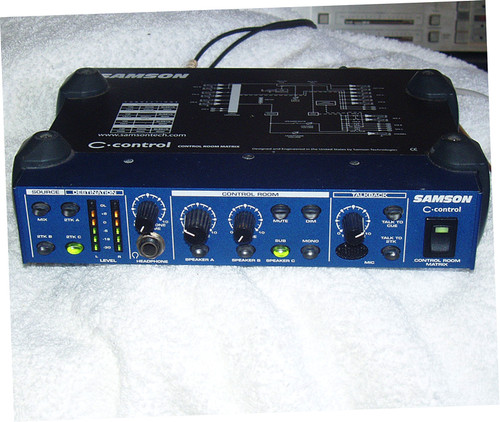Unipex is a Japanese designer and manufacturer of audio equipment, including microphones.
This microphone is imminently suitable for use in the studio (talkback from the desk to the recording booth/rooms) or perhaps radio communications (with some modifications)
Unipex Dynamic Gooseneck Microphone
Model: MD41
Mid 1980's vintage
Frequency response is 100Hz - 10Khz
Uni-directional pattern
Base mounted audio ON-OFF slide switch
Ball head 55mm diameter
Solid metal mesh ball construction
Dynamic microphone element 21mm diameter x 38mm long
Microphone element is not identifiable
Output impedance: 600 ohm (internal impedance matching transformer)
Unbalanced output due to the supplied TS lead with jack plug although balanced is available at the output socket, rewiring a lead to a TRS jack will provide a balanced output.
All high grade metal components i.e head, microphone body, gooseneck, base support.
NO metalised plastic materials used!
Balanced or unbalanced output - currently wired for unbalanced output
5 pin male mini-XLR output socket
Long, strong gooseneck 330mm in length
No "lash back" i.e once moved to position, the gooseneck stays where it was positioned by the user - "no droop"!
Supplied with a 5 metre lead which is terminated with a standard TS 1/4" jack plug (unbalanced audio output)
See my information below regarding this lead and changing to a balanced output
COSMETIC CONDITION:
Very good to excellent - no physical damage EXCEPT a small mark on the microphone barrel which is barely noticeable.
No discolouration to any of the metal, including the head (no vocal moisture damage)
Ball head is without any damage
Gooseneck is not misshapen and when positioned, securely remains in place - very strong.
Desk mount hardware is supplied or the gooseneck could be removed from the base assembly if desired.
TESTING:
This is a very solid desktop mounting microphone and extremely easy to access all parts for examination/modification or repair.
The head unscrews, the body unscrews, the gooseneck unscrews from the base assembly.
The output connector can be removed if required.
The mute ON-OFF switch is easy to access (2 very small screws, Philips head)
Slide switch has been cleaned (just routine maintenance, there was no issue beforehand)
The lead mini XLR connector is a real beauty, disassembles completely and very well made. Terminations at this plug are solder type.
WORD OF WARNING: If you wish to get inside the mini XLR connector, there are two very very small grub screws! Take great care removing/storing and re-inserting these - a magnetic jewellers screwdriver comes in handy here! It may also help to know that after these grubs screws are removed, the outer metal body UNSCREWS, it does not just "pull off"
NOTES REGARDING CHANGING THE OUTPUT TO BALANCED.
The audio from the internal transformer is balanced, this audio signal is present at the mini XLR male connector as follows:
Pin 1 - audio
Pin 2 - hot
Pin 5 - ground
The remaining two pins (3,4) are not connected.
The lead is 2 core so it is suitable for immediate use in a balanced audio situation.
At the other end, the TS 1/4" jack plug is moulded onto the cable, this would need to be cut off and replaced with either a TRS 1/4" jack plug or a standard 3 pin XLR.
Oh, and finally I can confirm that it is working fine. No strange noises/just nice clean audio.
The mute ON-OFF switch works effectively and WITHOUT any horrible "clunks" added to the audio!
One last note (promise) is that I noticed inside the head has NO filtering at all (spit etc) although the microphone element does have a fine (non-removeable) gauze. It would be a good idea to slip in a small piece of non-dense foam so that those spits and dribbles are kept away from the element! I would guess that there was one originally but it has since disintegrated over the years (common problem with old foams)
Very nice old school gooseneck microphone, ready for use in the studio as a talkback mic or possibly radio communications desk microphone (although a push button PTT button would need to be allowed for).















